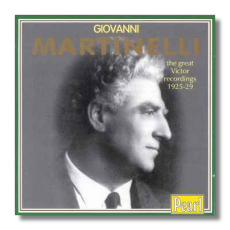
The Internet's Premier Classical Music Source
Related Links
- Latest Reviews
- More Reviews
-
By Composer
-
Collections
DVD & Blu-ray
Books
Concert Reviews
Articles/Interviews
Software
Audio
Search Amazon
Recommended Links
Site News
 CD Review
CD Review
Giovanni Martinelli

The Great Victor Recordings, 1925-29
Giovanni Martinelli, tenor
Various accompaniments
Pearl GEMS0030 ADD, monaural 2CDs 73:48, 78:07
Looking back at the 1920s and 30s, I feel envy for people who could walk into opera houses and actually see performances by Caruso, Gigli, Lauri-Volpi, Schipa, McCormack, et al. They all weren't great actors, but their voices had such personality that it didn't matter. You knew who they were three seconds after they opened their mouths, and they threw themselves into what they were doing with integrity and generosity. Martinelli was a singer like that. He sang professionally for forty years (1910-1950) and made hundreds of recordings. This set is a 31-item "greatest hits" collection that is centered around a mere five years of Martinelli's activity in Victor's studios. It sets musical standards that no tenor active today has reached, let alone surpassed.
Martinelli's voice gets its distinctive quality from its bright, trumpeting sound, its vibrato, and the canny use of brilliant vowel sounds. He could sing and control very long phrases with a single breath. When he sang softly, his voice retained its penetration and focus, and it gained insinuating warmth. His use of legato probably was as natural as his winning personality.
The first disc contains extensive excerpts from Il Trovatore, Aïda, and La Forza del destino. (For an even more thorough overview of Martinelli's work in these operas, go to Pearl GEMMCD9350 and GEMMCD9351). Manrico, Radamès, and Don Alvaro were ideal roles for Martinelli at this stage of his career. They demand a heroic ring and romantic ardor of which he seemed to have an endless supply. His colleagues on these early electric recordings include Rosa Ponselle, Ezio Pinza, Louise Homer, and Giuseppe de Luca. One interesting bonus is a Vitaphon recording of "Celeste Aïda." This was an early music video of sorts, and the medium allowed longer recording times than the 78-rpm side. Martinelli takes advantage of the situation by becoming more expansive, and the gain is palpable - compare tracks 6 (a 1926 Victor side) and 9 (a Vitaphon disc from the same year) and hear.
The second disc contains songs and arias from the verismo territory. Although Martinelli has been pigeonholed as a Verdi tenor, he was just as rewarding in Puccini, Giordano, Leoncavallo, and Mascagni, as can be heard here. His heart-broken cantabile in the second half of "No, Pagliaccio non son" makes Leoncavallo's reluctant clown into a flesh-and-blood tragic figure. For sheer beauty of tone wedded to dramatic intensity, try "Come un bel dì di maggio" from Giordano's Andrea Chénier. The songs, some sacred and others secular, also are endearing, even Giovinezza, whose Fascist theme apparently was not troublesome in 1926, when it was recorded. The second disc ends with La leggenda del piave, recorded at the same time as Giovinezza. For sheer life-giving ebullience and vocal generosity, few recordings match this one.
The transfers are by producer Roger Beardsley, whose interesting booklet note gives insight into what his job is like. Compared to the Nimbus Prima Voce transfers of some of these sides, Beardsley's work is brighter sounding. Surface noise is more prominent, but not to the level of distraction. At times (mostly on the first disc), these transfers are a little more fatiguing than some others that I've heard, and Martinelli's voice takes on a vaguely uneasy quality. This is a minor complaint, though, certainly not enough to spoil the singing, or this excellently devised set. Beardsley is not alone in loving Martinelli. Get this collection and you will too.
Copyright © 1999, Raymond Tuttle


















